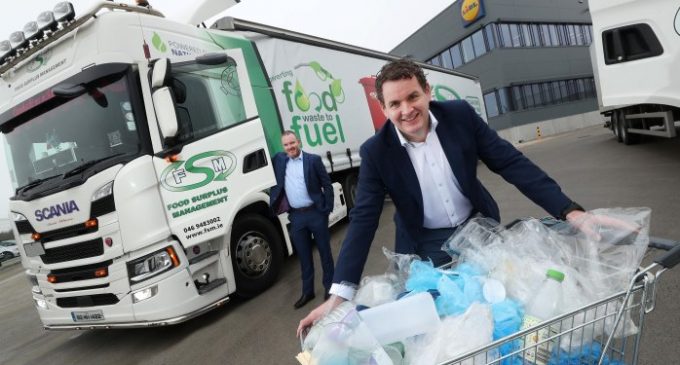Lidl Ireland & NI launch first island-wide supermarket circular economy strategy

Headquartered in Tallaght, County Dublin, Lidl Ireland & Northern Ireland is set to become the first large nationwide supermarket to establish a circular economy strategy, helping to fuel its logistics chain using food waste from its 209 stores on the island. In the Republic, Lidl, who were recently named the Most Reputable Supermarket in Ireland[1] are building on their longstanding partnership with Trim-based Food Surplus Management (FSM), who will collect the retailer’s food waste and customer’s recycling deposits directly from their stores and 3 regional distribution centres across the region. The food waste will then be converted to renewable bio-methane and used to fuel the fleet responsible for collecting such waste from Lidl’s stores and regional distribution centres across the country, reducing carbon emission per truck by up to 93%.
In addition, FSM will collect soft and rigid plastics from the retailer’s stores including customer’s deposits and recycle them to make items such as garden furniture, pallets, and flower pots, closing the loop for a more sustainable future.
Lidl’s Northern Irish operations have partnered with local long-standing supplier McCulla Transport to launch a fully green transport fleet powered by waste-to-energy generation.
The new fleet of eight bio-methane powered trucks marks the first significant business integration between the transport and the nationwide supermarket retail sector in the region and represents a major step forward in its move to slash carbon emissions.
This May, McCulla will start to create fully renewable bio-methane gas at its anaerobic digester (AD) plant in Lisburn, Co. Antrim, to power a sustainable, next generation transport operation which then delivers produce to Lidl stores in the region every day.
Eamon Ryan, Minister for the Environment, Climate and Communications, welcomed the announcement: “Achieving a circular economy, where goods and materials are retained and reused for as long as possible, is essential for Ireland to meet its Climate ambition and to prevent wider environmental damage. This is why my department has committed to work in partnership with industry, retailers, and consumers through the Waste Action Plan to promote a more sustainable and responsible system.
“The announcement by Lidl is a wonderful example of the contribution which the retail sector can make toward achieving the circular economy in Ireland. It creatively addresses two of the largest global environmental challenges, food waste and plastic pollution, both of which have very significant climate impacts. I congratulate Lidl for continuing to show leadership in relation to the environment and sustainability and look forward to more companies following in their footsteps.”
J.P. Scally, Chief Executive Officer of Lidl Ireland & Northern Ireland, said: “We are pleased to be the first large nationwide supermarket to launch a circular economy strategy across the island that underlines our commitment to developing sustainable and innovative solutions that will have a tangible impact in every area of our business. From being the largest owner of solar panelling in the country to using renewable electricity to power our stores, at Lidl, it is our priority to continue to advance our thinking, and challenge ourselves as a business to develop new ways of making our operations the most sustainable in the country.
“In addition, we are pleased to work with two long-standing local suppliers, Food Surplus Management and McCulla Transport, in developing this first-to-market approach, and to be the first large supermarket retailer to successfully integrate a waste-to-energy sustainable transport model. These fleets cover nearly 6,000 road kilometres per day across both regions, ensuring the safe and timely delivery of food to our stores in Northern Ireland and collection of waste from our store network across the Republic of Ireland. We’re proud to pave the way for the sector, and for Ireland and Northern Ireland in driving a cleaner, greener economy through responsible business practice.”
Niall Lord, Chief Executive Officer of Food Surplus Management said: “We are delighted to continue our long-standing partnership with Lidl Ireland and to assist in providing sustainable and innovative solutions in food waste and packaging. Food Surplus Management is particularly excited about our innovation in the recycling of food packaging plastics and other previously unrecycled hard plastics which offers a more sustainable waste management service to retailers. Lidl’s continued support and input into creating a circular economy is of benefit to all businesses. We look forward to partnering with Lidl to develop new and innovative solutions in the area of food waste management and plastics recycling.”
The introduction of the new green transport fleet is the latest move by the retailer in delivering on its dedicated sustainability commitments as part of its overarching corporate social responsibility (CSR) framework ‘A Better Tomorrow’. The announcement comes as Lidl recently shared it was the first retailer in Ireland to remove ‘bags for life’ from sale in an industry-leading shift eliminating 6.3 million plastic bags from circulation.
Lidl’s CSR credentials have also been recognised on an international industry level with the retailer’s state-of-the-art regional distribution centre in Newbridge, Co. Kildare, being awarded BREEAM Excellence, the world’s leading sustainability assessment for buildings, and the first facility to receive this in Ireland.
Lidl has 209 stores on the island of Ireland and employs more than 6,000 employees across its store network, 4 regional distribution centres and Dublin head office.



























